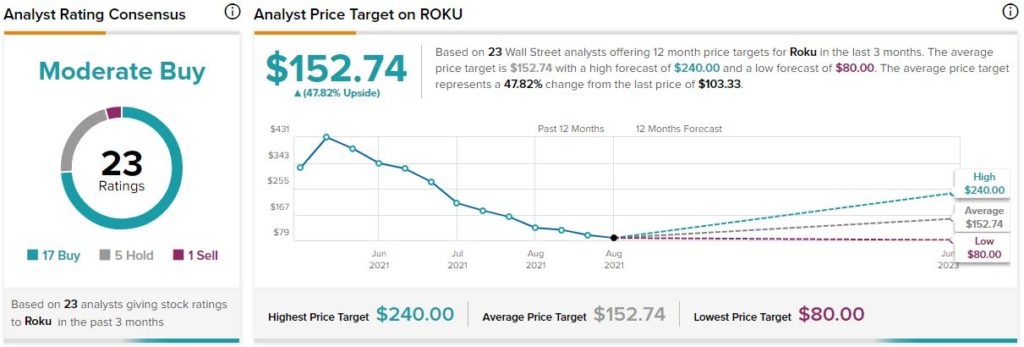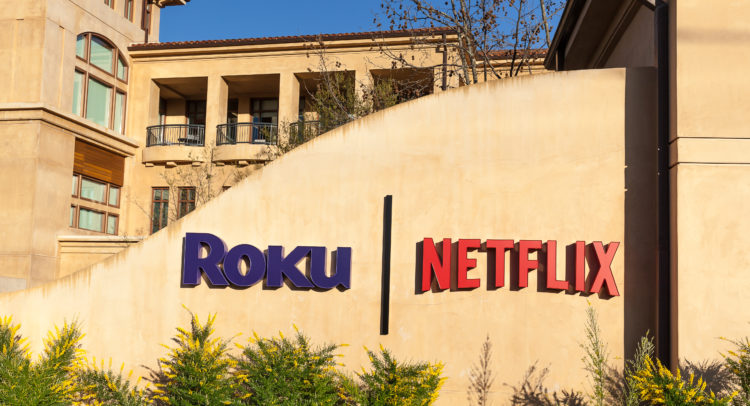Roku (ROKU) may be on the verge of one of its strangest roles ever. Strange, certainly, but also powerful – sufficiently powerful to push the streaming video platform and hardware maker up 8.1% in premarket trading on Wednesday. The gains retreated a bit with Wednesday’s trading session but remained present regardless.
Perhaps strangest of all, Roku’s new role in the not-too-distant future will help give Netflix (NFLX) a whole new life following its disastrous last-quarter earnings report.
I remain bullish on Roku because this highly-versatile streaming platform has made some terrific moves in branching out lately. The new potential connection to Netflix would likely only drive the company’s potential forward from there.
The last 12 months for Roku have been pretty much all downhill. The company lost over 75% of its value from its height last July when $500 per share seemed possible. Today, it trades for just over $100.
It’s the latest news that’s starting to fire up trading at Roku again; recent reports emerged that Roku might be coming back to Netflix. Roku originally started life as a division of Netflix, and now, a much-changed Netflix may be looking to bring Roku back into the fold with an acquisition.
Wall Street’s Take
Turning to Wall Street, Roku has a Moderate Buy consensus rating. That’s based on 17 Buys, five Holds, and one Sell assigned in the past three months. The average Roku price target of $152.74 implies 47.8% upside potential.

Analyst price targets range from a low of $80 per share to a high of $240 per share.
Investor Sentiment May be Turning Around
There is a fairly solid core of good investor sentiment around Roku. It’s not perfect, but Roku currently carries a Smart Score of 9 out of 10 on TipRanks. That’s the second-highest level of “outperform,” which suggests it’s quite likely that Roku will outperform the broader market.
One of the biggest marks in Roku’s favor is hedge fund involvement. Based on the results of the TipRanks 13-F Tracker, hedge funds increased their involvement by adding 2.3 million shares last quarter. This is the second quarter in a row hedge funds have pushed more cash into Roku. It’s also a new high-water mark for hedge fund involvement in the last two years.

Insider trading, however, is a bit of a different story. Insider trading was all but silent after February until May, when insiders staged one Buy transaction and four Sell transactions, selling $254,200 worth of stock. Going back over the full year shows a lot of selling but quite a bit of buying as well. Insiders staged 59 Sell transactions but 36 Buy transactions.
The sheer regularity of the buying transactions was especially unusual; there were four insider Buys a month, every month, from June 2021 to January 2022. February was the first deviation, where only three Buy transactions were staged.
As for retail investors who hold portfolios on TipRanks, their interest is retreating a bit, but only after a recent run-up. TipRanks portfolios holding Roku were down 0.1% in the last seven days after being up 1.1% in the last 30 days. As for Roku’s dividend history, Roku is still clearly focused on growth, as the company has announced no dividend to date.
A Big Turnaround, but for Who?
The notion that Netflix would take an interest in Roku isn’t all that surprising once the two companies are more closely considered. Netflix famously took a beating with its last quarterly report, as the company revealed it was hemorrhaging subscribers.
In turn, Netflix announced several measures designed to get the company back on track. Measures planned included the cancellation of numerous projects, a fundamental shift to its corporate culture, the more active pursuit of password sharers, and the potential for an ad-supported tier of operation to draw in customers with lower prices.
There’s one other point that’s been worrying at Netflix for some time now: content. Netflix used to be the central clearinghouse for online streaming operations. Studios would basically just deposit their libraries with Netflix because no one really knew how well this whole “streaming-video” thing would work out.
Once Netflix proved what kind of titanic opportunity streaming video represented, studios rushed to build their own streaming operations. They took back their catalogs once the licensing agreement terms expired, and that left Netflix a bit in the lurch. Netflix responded by bulking up its internally-developed content – with varying levels of success.
This brings us around to Roku. Roku has made a significant advance in the ad-supported segment. Pretty much all of its operations have had advertising support.
Roku, in fact, built an ad-support platform that brought in around $647 million just in first-quarter revenue. That’s just the kind of mojo that Netflix would want behind an ad-supported operation. With the Netflix catalog to draw from, advertisers should be particularly interested in buying ad space.
Roku even recently went so far as to close the window where employees could sell vested stock grants. Such a move may suggest something is afoot. Roku may want to limit insider trading to not suggest any sign of weakness as it negotiates a sale price. That isn’t confirmed, of course, but it does suggest a possibility.
In fact, such a move would give Roku a shot in the arm as well. Roku has been actively competing with several other major brands in the field, from Alphabet (GOOG) to Apple (AAPL). With hardware sales starting to slump, Roku needs to focus on viewership numbers to keep its ad sales high.
Netflix’s catalog—which will improve by $33 billion in spending this year—could be just the ticket. Last year around this time, Roku announced it was spending $1 billion on new content. Netflix is spending over 30 times that number. That should light a fire under Roku and make its ad support potential that much better.
Concluding Views
It’s hard to tell who would benefit more from a Netflix acquisition of Roku. Roku’s value would certainly climb.
Netflix, meanwhile, may be able to solve a lot of its problems by pulling Roku into the fold. Roku has already generated substantial ad revenue, and Netflix wants to backstop its subscriber rates with ad support. Clearly, Roku knows how to do ad support, so having those contacts involved would only help.
By itself, Roku is a decent proposition. It could be even better as part of Netflix. So right now, I’m bullish on Roku, the company that can stand on its own but may be much better as part of something else.









